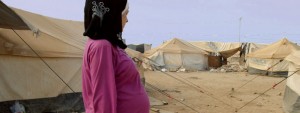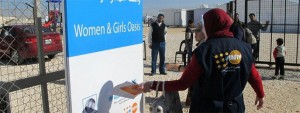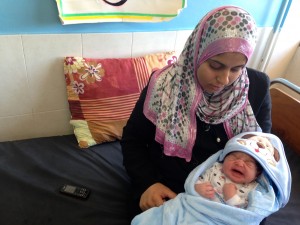Refugees, Women’s Rights, and Reality in Gaza
Aug 4th, 2014 | By admin | Category: Reproductive Rights/Women's RightsBy Suzanne York, www.howmany.org
Try to imagine giving birth in a spartan refugee tent, or worse, while missiles are exploding around you. Or simply visualize having to have your reproductive and women’s health needs met in a war zone.
For women (and men) in the Gaza Strip, survival is paramount, but so is confronting the reality of pregnancy, contraception, and other healthcare needs.
You Can’t Put a Pregnancy on HoldAccording to the UN Office for the Coordination of Humanitarian Affairs, over 140,000 people have been displaced by the hostilities in the Gaza Strip. Of this, it is estimated that, among those displaced, there are 25,000 women of reproductive age and 5,000 pregnant women.
The United Nations Population Fund (UNFPA) and other humanitarian organizations have expressed concern over the impact of the Gaza conflict on women’s health and access to safe births.
In a press release last month, the UNFPA stated “Reports of destruction of hospitals and health facilities are disturbing as some 45,000 pregnant women in Gaza are currently in need of maternity care.”
Unsurprisingly, this is causing increased stress and anxiety, and many women are more likely to face obstetric complications with limited access to maternal health services due to the conflict.
“It is critical that humanitarian assistance, including medical supplies and equipment, be given safe passage into Gaza to enable us to provide the much-needed assistance to pregnant women,” said UNFPA Executive Director Dr. Babatunde Osotimehin. ”Pregnant women in particular must be allowed unhindered access to maternal health services to ensure their safety throughout their pregnancy and childbirth.”
Respecting Reproductive Health
Gaza, of course, is not alone. Syria, South Sudan, Iraq, and DR Congo are just some of the biggest humanitarian crises in the world today. And they all have women struggling to meet their reproductive health needs.
CARE, in a reporton sexual and reproductive health in emergencies, spelled it out:The reality is that sex, conception and pregnancy continue to happen in emergencies. In displaced populations, approximately four percent of the total population may be pregnant, which means in a population of 100,000 people, 4,000 women will be pregnant in one year. Approximately 15% of those pregnancies will end in a serious, potentially life-threatening complication requiring medical intervention. Furthermore, women and their partners may wish to prevent unwanted pregnancy during this time of conflict and upheaval… Women face an acute increase in violence against them during crisis when social systems are destroyed and sexual violence is often used as a weapon of war. UNFPA estimates that 25 to 50 percent of maternal deaths in refugee settings are due to complications of unsafe abortion.
In Gaza, hospitals and medical centers are struggling to deal with casualties. CARE is just one organization attempting to help women cope in this latest escalation. Along with the Palestinian Medical Relief Society, the two groups – when the security situation allows it – will focus on women’s health needs, particularly pre- and post-natal care for pregnant women and new mothers with infants.
Prioritizing Women’s Rights
In the Inter-agency Field Manual on Reproductive Health in Humanitarian Settings, a collaboration of several UN agencies, it is noted that reproductive health is an essential component of humanitarian response. “Reproductive health is a human right, and like all other human rights, it applies to refugees, internally displaced persons and others living in humanitarian settings. To realize this right, affected populations must have access to comprehensive reproductive health information and services so they are free to make informed choices about their health and well-being.”
The needs of all people in a conflict situation are enormous. But the needs of women in particular are great, and all too often ignored or violated. Their rights must be met and respected.
As images from Gaza and other regions of conflict momentarily grab the world’s attention, consider how it must feel to be a woman caught up in it.
(For more information, see also this blog post entitled “The Reproductive Rights of Refugees.”)
Suzanne York is a senior writer with the Institute for Population Studies.



